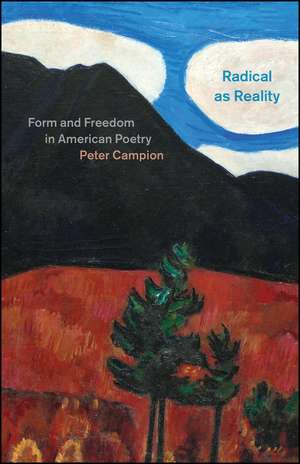Radical as Reality: Form and Freedom in American Poetry
Autor Peter Campionen Limba Engleză Paperback – 17 oct 2019
What do American poets mean when they talk about freedom? How can form help us understand questions about what shapes we want to give our poetic lives, and how much power we have to choose those shapes? For that matter, what do we even mean by we? In this collection of essays, Peter Campion gathers his thoughts on these questions and more to form an evolutionary history of the past century of American poetry.
Through close readings of the great modernists, midcentury objectivists, late twentieth-century poets, his contemporaries, and more, Campion unearths an American poetic landscape that is subtler and more varied than most critics have allowed. He discovers commonalities among poets considered opposites, dramatizes how form and history are mutually entailing, and explores how the conventions of poetry, its inheritance, and its inventions sprang from the tensions of ordinary life. At its core, this is a book about poetic making, one that reveals how the best poets not only receive but understand and adapt what comes before them, reinterpreting the history of their art to create work that is, indeed, radical as reality.
Through close readings of the great modernists, midcentury objectivists, late twentieth-century poets, his contemporaries, and more, Campion unearths an American poetic landscape that is subtler and more varied than most critics have allowed. He discovers commonalities among poets considered opposites, dramatizes how form and history are mutually entailing, and explores how the conventions of poetry, its inheritance, and its inventions sprang from the tensions of ordinary life. At its core, this is a book about poetic making, one that reveals how the best poets not only receive but understand and adapt what comes before them, reinterpreting the history of their art to create work that is, indeed, radical as reality.
Preț: 158.70 lei
Preț vechi: 186.85 lei
-15% Nou
Puncte Express: 238
Preț estimativ în valută:
30.37€ • 31.38$ • 25.28£
30.37€ • 31.38$ • 25.28£
Carte indisponibilă temporar
Doresc să fiu notificat când acest titlu va fi disponibil:
Se trimite...
Preluare comenzi: 021 569.72.76
Specificații
ISBN-13: 9780226663371
ISBN-10: 022666337X
Pagini: 256
Dimensiuni: 140 x 216 x 18 mm
Greutate: 0.57 kg
Ediția:First Edition
Editura: University of Chicago Press
Colecția University of Chicago Press
ISBN-10: 022666337X
Pagini: 256
Dimensiuni: 140 x 216 x 18 mm
Greutate: 0.57 kg
Ediția:First Edition
Editura: University of Chicago Press
Colecția University of Chicago Press
Notă biografică
Peter Campion is associate professor of English and a member of the graduate faculty in the creative writing program at the University of Minnesota. He is the author of three collections of poems, Other People, The Lions, and El Dorado.
Cuprins
Introduction: Radical as Reality
Part One
Frost and Stevens at the Casa Marina
A Dream We Dreamed Each Separately
John Berryman’s Acoustics
James Wright’s Classicism
Palpable Fact: James Schuyler and Immediacy
Part Two
Biographical Form: Five Poets
Mah Wallah-Woe
Larry Levis
Part Three
Verse Chronicle: Poems of Force
“The Wolf, the Snake, the Hog, Not Wanting in Me”: Poetry and Resistance
Free within Ourselves
Sincerity and Its Discontents
Acknowledgments
Works Cited
Index of Names
Part One
Frost and Stevens at the Casa Marina
A Dream We Dreamed Each Separately
John Berryman’s Acoustics
James Wright’s Classicism
Palpable Fact: James Schuyler and Immediacy
Part Two
Biographical Form: Five Poets
Mah Wallah-Woe
Larry Levis
Part Three
Verse Chronicle: Poems of Force
“The Wolf, the Snake, the Hog, Not Wanting in Me”: Poetry and Resistance
Free within Ourselves
Sincerity and Its Discontents
Acknowledgments
Works Cited
Index of Names
Recenzii
“Peter Campion’s Radical as Reality returns poetry reviewing to its central place in American literary culture. His muscular prose is addressed to the reader looking for the pulse of America as it beats in the passions and rhythms of our best poets.”
“Against our contemporary mania for growth, Campion positions poetry’s particular contribution to a human understanding of the last hundred years of history as a form of cunning motility. The last line of this book proclaims, “We’ll know the sincere poem by the way it moves,” and the essays within move deftly with the poems themselves, capturing both spirit and form. American poetry, in Campion’s story, doesn’t celebrate freedoms preserved but acknowledges reality changed. I remember some of these essays, when they first appeared in the best journals, as vitally acerbic and fiercely challenging. And they remain so—but the raw material of the necessary book that collects them, Radical as Reality, is revealed to be wonder rather than judgment. Here, poet-critic Campion celebrates the spaciousness and splendor of a found family of American poets, less fathered by the great men of Modernism and their heir, Robert Lowell, than fostered in their own diverse practices.”
"Campion takes the long, and occasionally sidelong, view: these essays aim to reopen the case of twentieth- and twenty-first-century American poetry—not least its shifting relations to sincerity, freedom, and form. In lucid, conversational prose, Campion draws richly on his wide and deep reading to reanimate (among other things) the case of Frost v. Stevens and signal works by Niedecker, Oppen, and Lowell, as well as numerous contemporary poets. Undogmatic yet willing to judge, this is a criticism of patience, clarity, and considered illumination."
